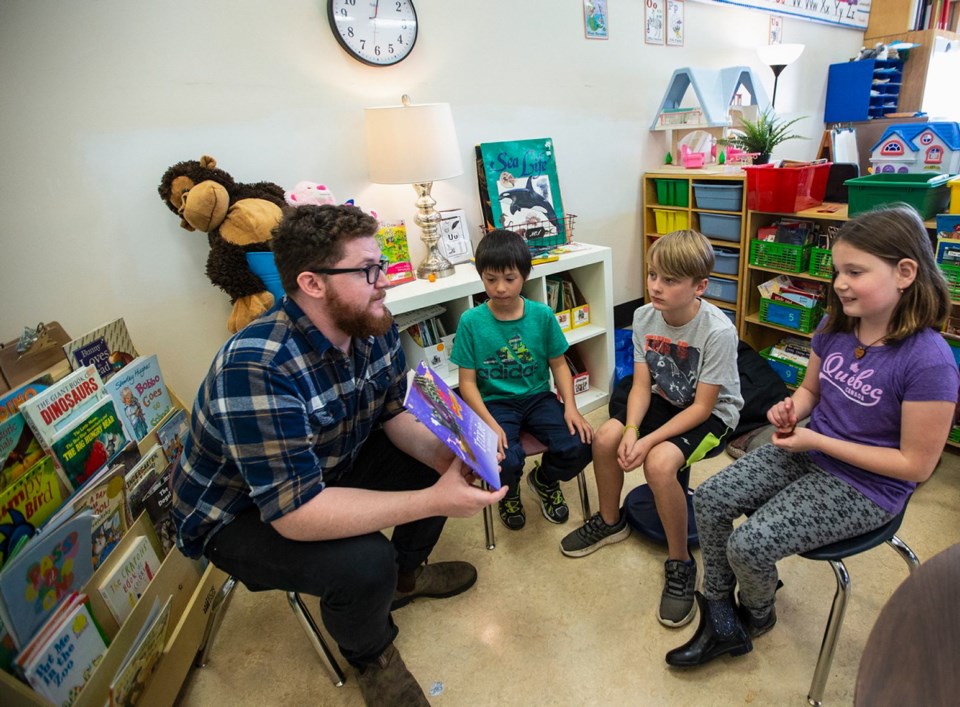Helping children become better readers and writers often seems to help with behavioural problems, say literacy experts.
“Teachers will tell us many of the kids we help out will calm down afterwards,” Christine Bossi, executive director of the Victoria Literacy Connection, said in an interview.
“[Kids] don’t want to create any ruckus in class anymore because they are getting it, they understand,” said Bossi. “They get bored and get restless when they don’t understand what is going on.”
Victoria Literacy Connection has been operating for almost two years, after forming in early 2017 when the child-focused Victoria READ Society joined the adult-oriented Literacy Victoria.
It’s now working with about 80 children in five schools in Victoria with an after-class program. For adults, there are about 100 students. One-on-one tutoring sessions are available for all ages.
A prison literacy program at Vancouver Island Regional Correctional Institute on Wilkinson Road is ongoing. In addition, this month, a High School Math Homework Club is scheduled to start at the University of Victoria with volunteer UVic students helping out.
The adult learning is supported by the provincial Ministry of Advanced Education through its Community Adult Literacy Program.
Donations — notably via the Times Colonist Book Drive, the Victoria Foundation and the Provincial Employees’ Community Service Fund — support the children’s literacy programs.
Literacy levels in B.C., according to the provincial Ministry of Education, are consistently among the best in Canada and the world. For example, the Conference Board of Canada recently ranked B.C. students first in the country and third in the world, close behind Japan and Finland.
But even the ministry’s figures show room for improvement.
In 2016-2017, 80 per cent of the students in Grade 4 were meeting or exceeding expectations for literacy skills. But by Grade 7, the number fell to 74 per cent, indicating something in the schools is not working consistently. Even at 80 per cent, one in five kids would be struggling.
Victoria Literacy Connection operates an after-school program with paid instructors assisting kids, called The Noisy Kids Reading Club. These reading classes take place in groups of up to six in five elementary schools. It also offers one-on-one tuition with select children and youth.
It’s called Noisy Kids for an obvious reason. Some children have too much energy to sit still and be quiet. Allowing them the freedom to move around, talk or laugh helps keep frustration levels down and gives them a chance to get in the extra learning needed.
These are not children who have been diagnosed with a learning disability or a special need. Special-needs children, once diagnosed, get support at their schools.
Noisy Kids, however, are identified by their teachers as having difficulties with reading and writing. For whatever reason, these children are simply not reading at the appropriate grade level.
“We work more in the grey areas, those kids who just need a little extra push,” said Bossi. “It’s for those kids who are not where they should be in terms of their reading level based on their grade.”
Bossi said reasons why children are not reading at an appropriate level can vary. Perhaps the child’s parents haven’t had time to read to them. Perhaps the child’s reading difficulties went unnoticed early on and they were able to just carry on in school.
The important thing is to make sure reading skills improve quickly.
“Otherwise they can just coast through school,” said Bossi. “They get to a certain point and it’s: ‘OK, wait a minute, I’m not going to graduate here.’ ”
David Fuerst Ackles, an instructor with the Noisy Kids reading club, said he has found the No. 1 issue with most of the kids he meets is a lack of confidence.
The children have experienced trouble that has gone unaddressed. Afterward, these kids learn to take refuge in their difficulties.
“The kids will be reading in a group and come across a word they can’t pronounce,” said Fuerst Ackles. “Immediately, they go to a place where it’s: ‘I don’t know, I can’t do it, it’s too hard.’
“So for me, it’s about helping them to understand reading is not the easiest thing in the world and you are going to struggle,” he said. “But you can do it and you already do it everyday.”
To learn more about Victoria Literacy Connection, how to support it or how to volunteer, go to victorialiteracyconnection.ca.



